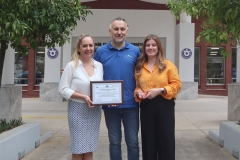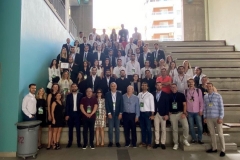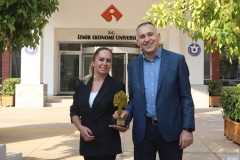
FACULTY OF BUSINESS
Department of Logistics Management
LOG 426 | Course Introduction and Application Information
| Course Name |
Global Supply Chain
|
|
Code
|
Semester
|
Theory
(hour/week) |
Application/Lab
(hour/week) |
Local Credits
|
ECTS
|
|
LOG 426
|
Fall/Spring
|
3
|
0
|
3
|
6
|
| Prerequisites |
None
|
|||||
| Course Language |
English
|
|||||
| Course Type |
Service Course
|
|||||
| Course Level |
First Cycle
|
|||||
| Mode of Delivery | Blended | |||||
| Teaching Methods and Techniques of the Course | DiscussionCase StudyLecture / Presentation | |||||
| Course Coordinator | ||||||
| Course Lecturer(s) | ||||||
| Assistant(s) | - | |||||
| Course Objectives | This course aims to to teach the following: 1. Globalization effect on supply chains 2.Principals of international logistics and supply chain 3. Global supply chain trends 4. International trade environment in global operations 5.Global freight markets |
| Learning Outcomes |
The students who succeeded in this course;
|
| Course Description | This course involves the issues that are critical for managing the international logistics and SCM operations efficiently. Course utilizes international trade and global marketing concepts. Real life cases are being used. |
|
|
Core Courses | |
| Major Area Courses |
X
|
|
| Supportive Courses | ||
| Media and Management Skills Courses | ||
| Transferable Skill Courses |
WEEKLY SUBJECTS AND RELATED PREPARATION STUDIES
| Week | Subjects | Related Preparation |
| 1 | Introduction | |
| 2 | Globalization and SCM | Related book chapters and articles |
| 3 | Protectionism and Impacts on Supply Chains | Related book chapters and articles |
| 4 | Discussion & Application 1 | Case Documents |
| 5 | Global Trade Environment | Related book chapters and articles |
| 6 | The International Legal Environment in Global Business: Playing By the Rules | Related book chapters and articles |
| 7 | Political and Economic Environment in Global Business and Impacts on Supply Chains | Related book chapters and articles |
| 8 | Culture Impact in Global Supply Chains | Related book chapters and articles |
| 9 | Resilince in Global Operations, Discussion & Application 2 | Case Documents |
| 10 | Understanding Global Supply Chain and Logistics Operations, Discussion & Application 3 | Related book chapters and articles |
| 11 | Guest Speaker | |
| 12 | Guest Speaker | - |
| 13 | Presentations | |
| 14 | Presentations | |
| 15 | Review of the Semester | |
| 16 | Review of the Semester |
| Course Notes/Textbooks | Global Logistics , New directio ns in supply chain management, By Donald Waters and Stephen Rinsler , 7 th ed., Sep 2014, by Kogan Publ. Ltd. a nd Global Logistics and Supply Chain Management , John Mangan/ Chandra Lalwani / Tim Butcher / Roya Javadpour, Second Edition 2011 , Joh n Wiley & Sons, Ltd, Chapter 10 |
| Suggested Readings/Materials | Various academic papers and cases. |
EVALUATION SYSTEM
| Semester Activities | Number | Weigthing |
| Participation | ||
| Laboratory / Application | ||
| Field Work | ||
| Quizzes / Studio Critiques | ||
| Portfolio | ||
| Homework / Assignments |
1
|
40
|
| Presentation / Jury |
1
|
30
|
| Project | ||
| Seminar / Workshop | ||
| Oral Exams | ||
| Midterm | ||
| Final Exam |
1
|
30
|
| Total |
| Weighting of Semester Activities on the Final Grade |
2
|
70
|
| Weighting of End-of-Semester Activities on the Final Grade |
1
|
30
|
| Total |
ECTS / WORKLOAD TABLE
| Semester Activities | Number | Duration (Hours) | Workload |
|---|---|---|---|
| Theoretical Course Hours (Including exam week: 16 x total hours) |
16
|
3
|
48
|
| Laboratory / Application Hours (Including exam week: '.16.' x total hours) |
16
|
0
|
|
| Study Hours Out of Class |
15
|
1
|
15
|
| Field Work |
0
|
||
| Quizzes / Studio Critiques |
0
|
||
| Portfolio |
0
|
||
| Homework / Assignments |
4
|
5
|
20
|
| Presentation / Jury |
1
|
45
|
45
|
| Project |
0
|
||
| Seminar / Workshop |
0
|
||
| Oral Exam |
0
|
||
| Midterms |
0
|
||
| Final Exam |
1
|
37
|
37
|
| Total |
165
|
COURSE LEARNING OUTCOMES AND PROGRAM QUALIFICATIONS RELATIONSHIP
|
#
|
Program Competencies/Outcomes |
* Contribution Level
|
||||
|
1
|
2
|
3
|
4
|
5
|
||
| 1 | To be able to analyze complex problems in the field of logistics and supply chains |
X | ||||
| 2 | To be able to have good knowledge of sector related market leaders, professional organizations, and contemporary developments in the logistics sector and supply chains |
X | ||||
| 3 | To be able to participate in the sector-related communication networks and improve professional competencies within the business sector |
X | ||||
| 4 | To be able to use necessary software, information and communication technologies in the fields of logistics management and supply chain |
|||||
| 5 | To be able to understand and utilize the coordination mechanisms and supply chain integration |
X | ||||
| 6 | To be able to analyze the logistics and supply chain processes using the management science perspective and analytical approaches |
|||||
| 7 | To be able to design, plan and model in order to contribute to decision making within the scope of logistics and supply chains |
X | ||||
| 8 | To be able to interpret and evaluate the classical and contemporary theories in the field of logistics and supply chains |
X | ||||
| 9 | To be able to conduct projects and participate in teamwork in the field of logistics and supply chains |
X | ||||
| 10 | To be able to have an ethical perspective and social responsiveness when making and evaluating decisions. |
|||||
| 11 | To be able to collect data in the area of logistics and communicate with colleagues in a foreign language ("European Language Portfolio Global Scale", Level B1). |
|||||
| 12 | To be able to speak a second foreign at a medium level of fluency efficiently. |
|||||
| 13 | To be able to relate the knowledge accumulated throughout human history to their field of expertise. |
|||||
*1 Lowest, 2 Low, 3 Average, 4 High, 5 Highest
NEWS |ALL NEWS

Teaching both at Izmir and Sweden
Making a difference with her successful work in the international arena, Assoc. Prof. Dr. Aysu Göçer, Lecturer at Department of Logistics Management,

Memorial Scholarship reached to 78 young people
The education scholarship given on behalf of the late Doğan Turhan, the philanthropist from Izmir, the founder of one of Turkey's largest

‘Green’ logistics going abroad
Assoc. Prof. Dr. Işık Özge Yumurtacı Hüseyinoğlu from Izmir University of Economics (IUE) Department of Logistics Management and her 3 students have

Double prize in logistics
The 'intelligent decision support system' named LTLZone, which was developed by a team of 3 people at Izmir University of Economics (IUE),

Double reward in logistics
The intelligent decision support system (IDSS) named ‘LTLZone’, which was developed by a team of 3 people at Izmir University of Economics

Department of Logistics Management 14th University-Industry Cooperation Event
Izmir University of Economics Logistics Management Department senior students continue to shed light on real logistics problems with the projects they developed






